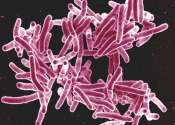Mycobacterium tuberculosis: Our African follower for over 70,000 years
Tuberculosis (TB) remains one of deadliest infectious diseases of humans, killing 50% of individuals when left untreated. Even today, TB causes 1-2 million deaths every year mainly in developing countries. Multidrug-resistance ...





